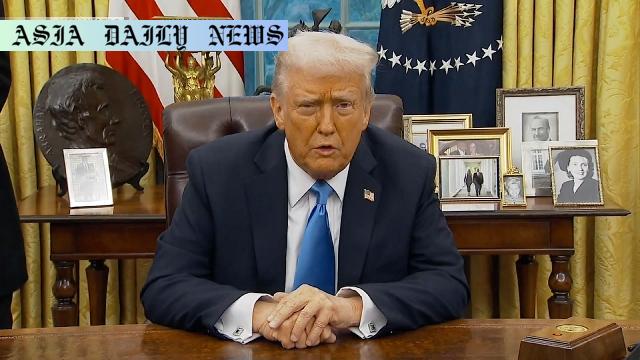Gaza: President Trump expresses optimism over a deal with Hamas on a ceasefire, with potential agreement expected within a week.
Key Point 1: Trump expects a positive outcome from talks on Gaza ceasefire with Hamas within the week.
Key Point 2: ‘Quite a few’ hostages are anticipated to be released soon.
Key Point 3: Trump hints at broader negotiations involving Israel and possibly a permanent Iran agreement.

Trump Expects Promising Outcomes from Gaza Ceasefire Talks
US President Donald Trump has indicated that progress is being made in ongoing efforts towards a Gaza ceasefire, with optimism that an agreement could emerge within the week. Speaking to reporters, Trump mentioned the possibility of a deal with Hamas being finalized soon, which raises hopes for an easing of tensions in one of the most deeply contested regions in the world.
Peace initiatives involving Gaza have continually been complex, marred by decades of unrest and deeply entrenched hostilities between various stakeholders. Trump’s comments are, therefore, significant as they suggest a renewed push by the US to mediate between the conflicting parties. With Hamas playing a critical role in the region, any breakthrough deal could have lasting implications for peace efforts.
Hostage Release and Wider Implications
A vital aspect of these discussions pertains to hostages held within Gaza. Trump has hinted at a breakthrough on this front as well, remarking that ‘quite a few’ of the detained individuals may be released soon. Such an achievement would bring relief not only to the families of those affected but also serve as a confidence-building measure in broader negotiations.
In addition to the immediate ceasefire discussions, Trump also implied ongoing dialogue on wider strategies with Israel. A notable piece of news is his mention of more extensive prospects for a ‘permanent deal’ involving Iran, signaling the possibility of multi-faceted negotiations spanning beyond current talks in Gaza.
US-Israel Relations Amidst Regional Diplomacy
Trump’s scheduled meeting with Israeli Prime Minister Benjamin Netanyahu at the White House underscores the importance of strengthening US-Israel relations amidst these developments. Both countries share strategic and geopolitical interests, and a joint emphasis on securing the region’s stability is evident in their continuous engagements.
The President has emphasized that discussions are ongoing but outlined his administration’s commitment to addressing the multifaceted challenges in the Middle East. Building sustainable peace in Gaza and possibly redefining terms with Iran would represent monumental shifts in US foreign policy direction within the region.
Challenges in Achieving Long-Term Stability
Although Trump’s statements exude optimism, the path to lasting peace remains rife with challenges. With Hamas and Israeli relations often hanging by a thread, it remains to be seen how effectively all parties can navigate political, social, and ideological differences. Ongoing conflicts and unresolved grievances often impede progress.
Additionally, achieving alignment on regional priorities requires an inclusive approach that considers perspectives beyond the US and Israel, involving other stakeholders like European allies and neighboring Arab nations. Diplomacy on this scale inherently requires patience, trust-building, and a long-term vision for peace.
As details of these negotiations unfold, public interest will continue to grow, particularly regarding the tangible outcomes for those directly affected by the prolonged crisis in Gaza. The eventual framework for a peace agreement could serve as a blueprint for addressing other global conflicts, offering valuable lessons in diplomacy amidst adversity.



Commentary
Potential Progress in Gaza Talks
President Trump’s remarks about impending positive developments in Gaza come as both a welcome relief and a source of renewed curiosity. The issue remains one of the most protracted conflicts in modern history, and any sign of forward movement inevitably sparks conversation. Trump’s claims of being ‘close to a deal’ with Hamas suggest substantial groundwork has already been laid, setting the stage for potentially transformative peace accords.
Hostages and Humanitarian Concerns
The situation with hostages deserves special attention. Trump’s indication that ‘quite a few’ of them might be released is undoubtedly a ray of hope for affected families, many of whom have lived in uncertainty for years. Hostage releases often serve as a gesture of goodwill that can set the tone for more comprehensive agreements. While the immediate concern is the repatriation of these individuals, the underlying humanitarian implications of long-standing detentions cannot be understated.
The Role of the US
The US’s mediating role underscores its influence in Middle Eastern geopolitics, but it also comes with significant responsibility. Balancing its relationship with Israel while engaging with opposing sides like Hamas and Iran is a tightrope act that requires strategic finesse. The inclusion of Iran in Trump’s comments also raises questions about broader policy shifts, likely signaling a more ambitious agenda for long-term stability in the region.
While optimism is high with these developments, it remains critical to assess outcomes on their merit. Words and promises must translate into actions and deliverables, and for now, the global community watches with tempered hope, eager to see if these negotiations lead to meaningful change.